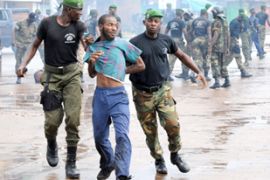‘Scores killed’ at Guinea protest
Security forces open fire on opposition supporters in capital, human rights group says.

A doctor at the Donka university medical centre appeared to confirm the toll given by the human rights group telling the AFP news agency: We have counted 52 bodies and six more have just come in.”
Other medical officials were quoted as saying that “dozens of bodies” had been taken from another hospital by the military.
‘Police state’
The protesters, who had gathered outside the stadium, carried placards reading “No to Dadis” and “Down with the army in power” before police stopped them from gaining entry.
Al Hassan Silah, a local journalist who visited the stadium shortly after the security forces had opened fire, said he and other journalists had seen bodies lying inside and outside the stadium.
|
“People did not wish for a military regime in Guinea because for almost 25 years Guinea was led by a military man” Lansine Kaba, |
“People who had gone to attend the protests have fled for dear life,” Silah told Al Jazeera.
“But Conakry can be rightly described as a police state… All across town, military people at checkpoints are searching people and people have been forced back into their houses.”
The military government, which took power last December, plans to hold elections in January 2010.
Lansine Kaba, a Guinean scholar at the Carnegie Mellon University in Qatar, said: “Many people don’t want the president to stand for election. He promised when they had the coup that he would not stand for elections.
“People did not wish for a military regime in Guinea because for almost 25 years Guinea was led by a military man,” he told Al Jazeera
The government had banned Monday’s demonstration, but a coalition of political parties, trade unions and civic organisations vowed that the event would go ahead.
Leaders arrested
Police arrested at least 30 people who were driven away in lorries, witnesses said.
Cellou Dalein Diallo, the leader of the opposition Union of Democratic Forces of Guinea (UFDG), and several other politicians were reportedly among those detained.
Mouctar Bah, a correspondent for the AFP news agency who also works for Radio France Internationale (RFI), was manhandled by uniformed men who took his microphone and recorder before shoving him to the ground.
Speaking on national television on Sunday, Frederic Kolie, the interior minister, declared that “all demonstrations on national territory are prohibited until the national holiday on October 2”.
News of the ban came a day after Camara – in his first visit outside the capital since he took power – went to Guinea’s second city and opposition stronghold Labe.
Camara seized power in the francophone West African nation after leading a bloodless coup within hours of the death of Guinea’s president Lansana Conte, who had been in power since 1984.